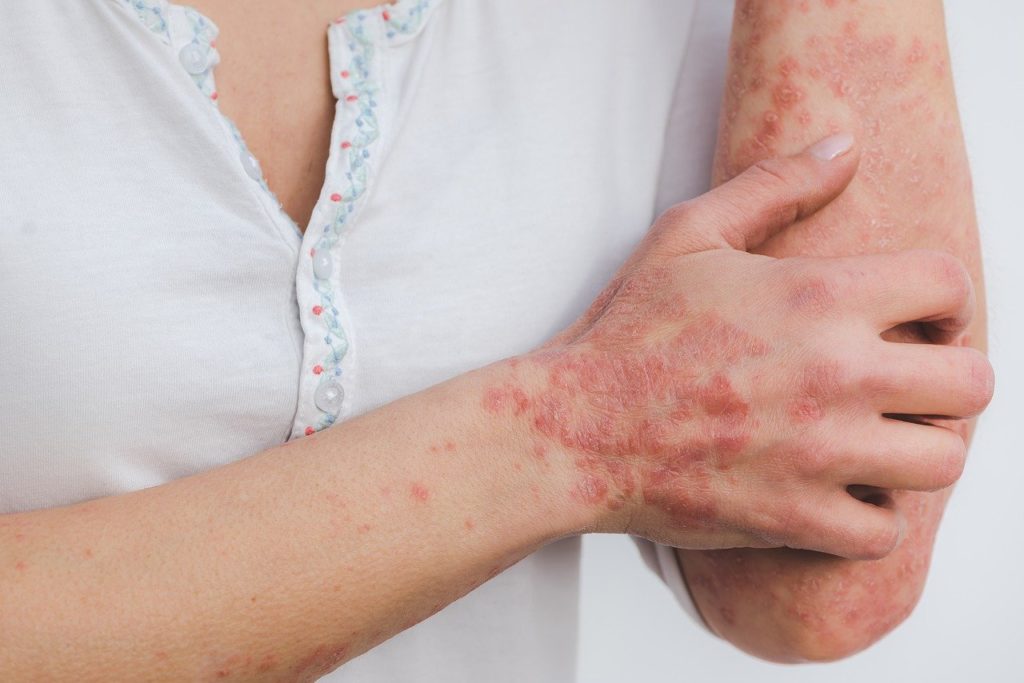
Psoriasis is a medical condition that affects more than 7.5 million people in Water Valley and elsewhere around the U.S. As such, it is serious business, and can be extremely uncomfortable and unsightly. Psoriasis primarily affects the skin, and since it’s an autoimmune response by the body, it cannot be cured. It is often mistaken for a rash, and if left untreated it will leave a person vulnerable to worse outbreaks and continuing discomfort. It always helps when the disease can be recognized for what it is, both by a senior and by their senior home care professional. That at least will allow for some kind of appropriate treatment to be administered. Here’s how you can help your senior loved one manage psoriasis.
Recognize the symptoms
Recognition of the symptoms of psoriasis is the first step toward obtaining proper treatment for it. When you identify one or more of these symptoms appearing on the skin of your elderly parent, you should have it checked out at the next doctor visit. Be aware that the skin is not the only place where symptoms might appear, because psoriasis also affects the fingernails, toenails, and scalp. A medical professional will be able to tell if these symptoms are just evidence of a simple rash, or if they are part of the host of psoriatic manifestations.
- reddened or pinkish bumps appearing on the skin
- itchiness, which can sometimes be fairly severe
- scaly or raised up skin on some areas
- fungus appearing around the fingernails
- dandruff which comes and goes and is sometimes quite pronounced
These are the most commonly appearing symptoms of psoriasis, and they can make a person quite uncomfortable at times. The inflammation and the itchiness can have a severe impact on a person, and can actually impact the quality of life. It can affect your ability to focus and it has been known to bring on bouts of depression. Your self-esteem can also be affected, since the symptoms are often highly visible, and can cause significant embarrassment. It can also cause considerable frustration and anxiety, since the disease can flare up and become intense at almost any time, often without any apparent trigger or provocation.
Known triggers for psoriasis
While psoriatic flare-ups are possible at any time and frequently are not triggered by any specific event, there are certain triggers that are known to sometimes bring on an episode of increased severity. Since the disease impacts everyone in slightly different ways, it cannot be said with certainty whether any of these triggers might affect a given person. However, certain events do seem to aggravate the presence of psoriasis in many people and are considered to be common triggers.
These include excessive use of tobacco and alcohol, skin injuries, some types of medication, weather that is cold or dry, infections, and stress, which seems to be the most common culprit of all. You can help your senior loved one avoid the worst episodes of psoriasis by doing your best to shield them from these triggers, so at least they won’t have to endure the most dire symptoms.
Be careful when bathing the elderly
When bathing an elderly loved one with psoriasis, some extra care should be taken. The water used should not be excessively hot, as this can exacerbate the condition and cause a painful reaction. Be sure your parent doesn’t stay in the water very long because that can dry out the skin, and make the symptoms even worse.
Since skin is already in a sensitive state, these things can cause it to be bothered much more. It’s probably a good idea to encourage your loved one to only bathe on an every-other-day basis, as opposed to daily bathing, for the same reason. Following each bath taken by a senior, their skin should have some kind of moisturizing agent administered, so as to relieve dryness and itchiness.
Make sure to follow the treatment plan
If you’ve taken your elderly parent to the doctor, and he/she has recommended a program of treatment, this should be faithfully followed, so as to stave off the worst effects of psoriasis. Many seniors on their own might tend to ignore or forget to follow through with any of these recommendations, so it’s important that you help them stick to the program. It may not cure the disease, but it should at least lessen the impact of whatever symptoms they’re experiencing.
Doctors will often suggest that a topical or cream be applied to affected areas, and in some cases, medications are also recommended. By helping your senior loved one follow up on your doctor’s treatment program, you can help them achieve the most comfortable daily life possible. Also, try to include some time in the sunshine for your elderly loved one, because natural sunlight has been shown to be an effective way to relieve symptoms – but don’t forget the sunscreen.
